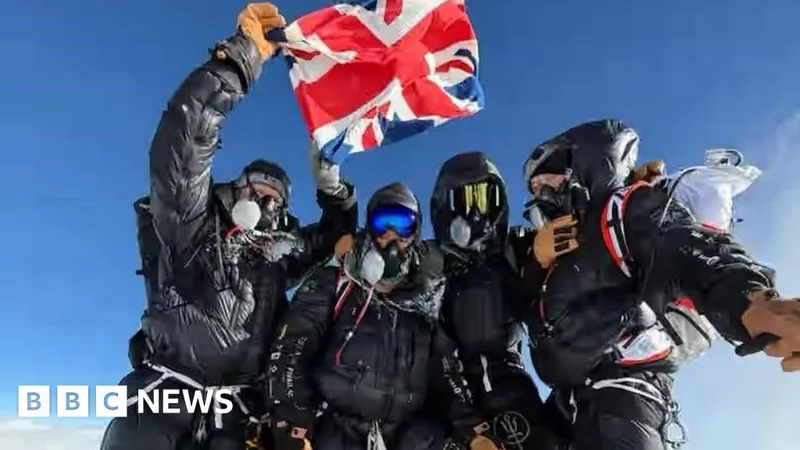
British Soldiers Break Records on Everest with Controversial Method!
2025-05-21
Author: Ling
Historic Ascent on Everest
In an astonishing feat, four British former special forces soldiers have etched their names in mountaineering history by conquering Mount Everest in under five days—without the traditional acclimatization process. Their unconventional ascent was controversially supported by xenon gas, aiming to enhance their performance at extreme altitudes.
A Bold Expedition
The intrepid team, which included UK veterans’ minister Alastair Carns, reached the towering summit of 8,849 meters (29,032 feet) early Wednesday. They set out on May 16 and reached the peak just four days and 18 hours later, a feat that raised eyebrows in the mountaineering community.
The Science Behind the Ascent
Typically, climbers spend six to eight weeks acclimatizing to the thin air on Everest, making this rapid ascent a subject of heated debate. By utilizing xenon, they aimed to simulate high-altitude conditions in advance—an approach that has been met with skepticism. As it stands, the record for the fastest summit remains held by Lhakpa Gelu Sherpa, who completed the climb in just under 11 hours—but after proper acclimatization.
An expedition organizer, Lukas Furtenbach, explained that the team trained in hypoxic tents to lower oxygen levels before heading to Nepal. Two weeks prior to their climb, they inhaled xenon gas—believed to help combat altitude sickness by potentially boosting red blood cell production. However, the scientific validity of this technique is still under scrutiny.
Controversy and Industry Concerns
Experts have raised alarms over the use of xenon, arguing it may not genuinely enhance climbing performance and could lead to dangerous outcomes. The International Climbing and Mountaineering Federation cautioned against relying on such shortcuts, underlining that acclimatization is a complex physiological process far beyond the effects of a single gas.
Fellow expedition leader Adrian Ballinger shares this concern, asserting that promoting xenon gas as a performance booster might undermine fairness in the sport. He advocates for the rigorous and time-honored methods of acclimatization and training.
Implications for Nepal's Climbing Industry
As the British team's unprecedented ascent sparks excitement, it raises questions about the future of climbing in Nepal. Expedition operators are concerned that this method could lead to shorter stays in the mountains, potentially harming the local tourism industry. Damber Parajuli of the Expedition Operators Association warned that racketing up fast climbs without acclimatization could ultimately jeopardize safety and integrity in mountaineering.
A Shorter Climb for a Greener Future?
Yet, proponents of the new method argue that swift ascents result in a smaller carbon footprint and reduced ecological impact. Furtenbach stated that minimizing time at high altitudes could protect climbers from health risks associated with prolonged exposure.
Nepal's Department of Tourism Responds
In light of this groundbreaking climb, Nepal's tourism officials are now re-evaluating regulations surrounding acclimatization and certification for summiting Everest. As director Narayan Regmi sits down to discuss future actions, the landscape of high-altitude climbing may be poised for a significant shift.
The Quest for Speed vs. Tradition
Ultimately, this event raises critical questions about the balance between innovation and the long-held traditions of mountaineering. As climbers continue to push the boundaries of what’s possible, the debate over the impact of these new methods will certainly intensify in the climbers' community.


 Brasil (PT)
Brasil (PT)
 Canada (EN)
Canada (EN)
 Chile (ES)
Chile (ES)
 Česko (CS)
Česko (CS)
 대한민국 (KO)
대한민국 (KO)
 España (ES)
España (ES)
 France (FR)
France (FR)
 Hong Kong (EN)
Hong Kong (EN)
 Italia (IT)
Italia (IT)
 日本 (JA)
日本 (JA)
 Magyarország (HU)
Magyarország (HU)
 Norge (NO)
Norge (NO)
 Polska (PL)
Polska (PL)
 Schweiz (DE)
Schweiz (DE)
 Singapore (EN)
Singapore (EN)
 Sverige (SV)
Sverige (SV)
 Suomi (FI)
Suomi (FI)
 Türkiye (TR)
Türkiye (TR)
 الإمارات العربية المتحدة (AR)
الإمارات العربية المتحدة (AR)